Sydney train strike called off after Commission ruling
SYDNEY’S train strike on Monday is off after a successful legal action by the NSW Government today.
NSW
Don't miss out on the headlines from NSW. Followed categories will be added to My News.
SYDNEY’S train strike on Monday is off after a successful legal action by the NSW Government today.
The Fair Work Commission suspended the overtime ban which cut trains services in half today and Monday’s planned strike by rail workers for six weeks. The suspension comes into effect at 6pm tonight.
Rail, Tram and Bus Union NSW Secretary Alex Claassens said the union would adhere to the Commission’s ruling and call off the strike.
“Of course we will always adhere to Fair Work Commission rulings, but a much quicker resolution to this would be for the Transport Minister to simply come to the table with a fair and reasonable agreement for the workforce,” he said. “Commuters and workers deserve a quick resolution to this.”
NSW Premier Gladys Berejiklian labelled the decision a “huge relief”.
“We wanted to make sure that the customers not only avoided inconvenience, but also had certainty about rail services into the future,” she told reporters in Sydney.
“Now, we have certainty. It’s business as usual. (But) I would have preferred the union movement had withdrawn the strike action prior to us having to take the legal action.”
COMMISSION’S DECISION
In court today, Commissioner Jonathan Hamberger said he expected the Rail Tram and Bus Union and Sydney Trains to use the six weeks to come to an agreement on pay and conditions.
He said the industrial action “threatens to endanger the welfare of a part of the population”, including businesses and people who would “suffer from the increased congestion”.
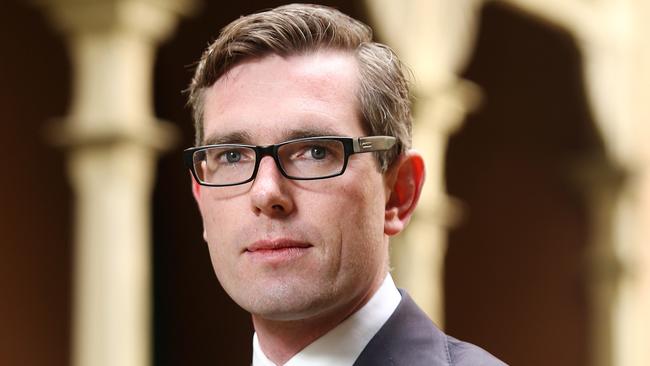
The legal action was brought by Industrial Relations Minister Dominic Perrottet and Sydney Trains late yesterday to stop an overtime ban started by the Rail Tram and Bus Union today and a 24-hour strike planned for Monday.
It was adjourned until this morning, just as the first disruptions of the ban begin to hit the system, with the commissioner making his ruling soon after lunchtime.
In the commission this morning, Michael Seck for Sydney Trains argued that the “central issue” of the six-month-old dispute was pay but that the union had only agreed to negotiate on that from Monday.
He said the union had conducted “a straw poll” of its members by SMS of the latest 3.45 per cent pay offer and that only five per cent had responded. Those who did not respond to the text message were assumed to have approved the strike action.
“Not all members have been given the opportunity to express their views,” he said.
Mr Seck asked for industrial action to be stopped to allow for a “cooling off” period for the discussions and for the union to properly canvas its members.
He said Monday’s action was designed to cause “maximum inconvenience to commuters” with children returning to school and workers returning from holiday.
Bus alternatives would only be able to take 15 per cent of the one million passengers who travel on trains every day.
He said the overtime ban was now susceptible to unexpected absenteeism or “the blue flu”.
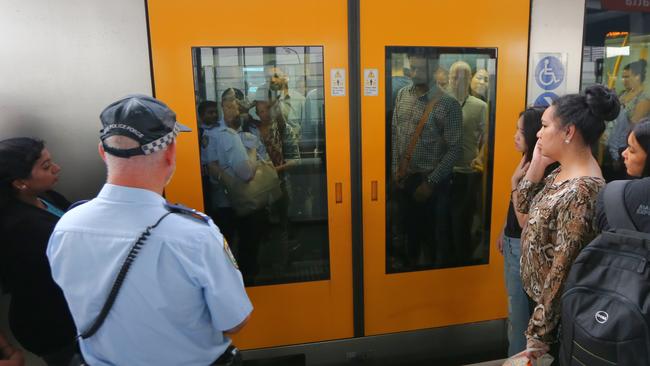
Mr Perrottet’s legal counsel Michael Easton said any suggestion the industrial action would not significantly affect the Sydney and NSW economy was “extraordinary”.
He pointed to evidence from the NSW Treasury that the strike could cost the economy between $50 and $90 million.
Rail Tram and Bus Union lawyer Anthony Howell said union bosses had been “reasonable and moderate” in bringing in an overtime ban and one-day strike on Monday.
Train workers had authorised union bosses to carry out much tougher action, Mr Howell said.
“This action is not top down,” he said.
Mr Howell said train workers were angry with their bosses and “want to punch them on the nose”.
RELATED NEWS:
Live blog: Commuters left stranded
Text message that sent trains into chaos
Choke points: How your line is affected
He said the estimated $90 million cost of a strike on Monday would not significantly damage the NSW economy.
“In the context of the economy of $600 billion it is minuscule,” he said.
As Sydney commuters struggled to work with dramatically reduced train services, Mr Howell asked for more time to prepare his case.
But Commissioner Jonathan Hamberger told him: “I hear what you say but I think we should kick on.”
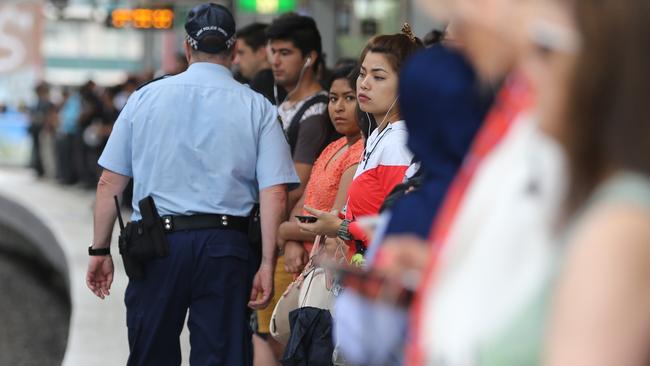
And when Mr Howell asked for an adjournment to read submissions from witnesses called by the NSW Government lawyer’s he received a slap down from the bench.
“That’s what the adjournment last night was for,” said Mr Hamberger.
PREMIER STEPS IN
Earlier today Premier Gladys Berejiklian became directly involved in the negotiations and met with the union.
Ms Berejiklian and Transport Minister Andrew Constance met with Rail, Tram and Bus Union NSW secretary Alex Classens at the government’s Martin Place office this morning.
It’s understood she had previously been guiding Mr Constance on how to handle negotiations, and this was the first time she has spoken directly with the union since the squabble started.
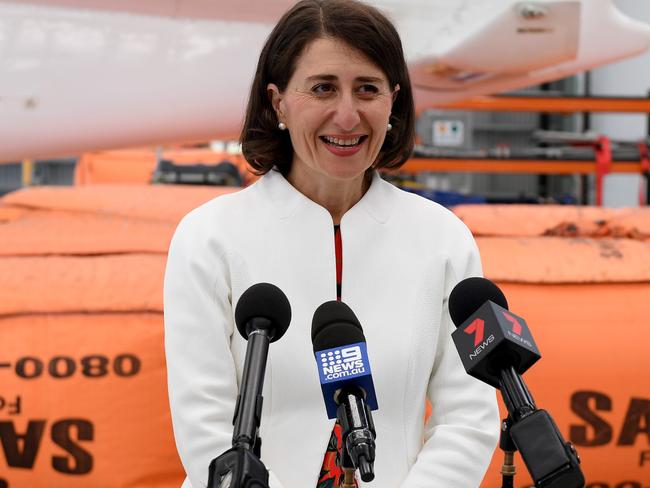
It is believed the Premier expressed her desire to end the strike but did not give the union any further offers.
Union attempts to stall legal proceedings to stop Monday’s train strike were then slapped down in the Fair Work Commission.
IMPACT OF A STRIKE
The Commission heard evidence from The Department of Justice’s Michael Baldi that up to 45 per cent of the department’s staff would “not be able to attend work as a result of the strike”, although prison officers would not be greatly impacted to the remote locations of prisons.
The Department of Education’s Robyn Bales said “we do have students who could make the decision not to go to school if the train was delayed”.
And City of Sydney’s Susan Pettifer said a contingency plan had already been activated and rubbish collection and ranger services were likely to be affected.
THE MORNING COMMUTE
Meanwhile, commuters across Sydney were left to deal with the impact of reduced train services this morning.
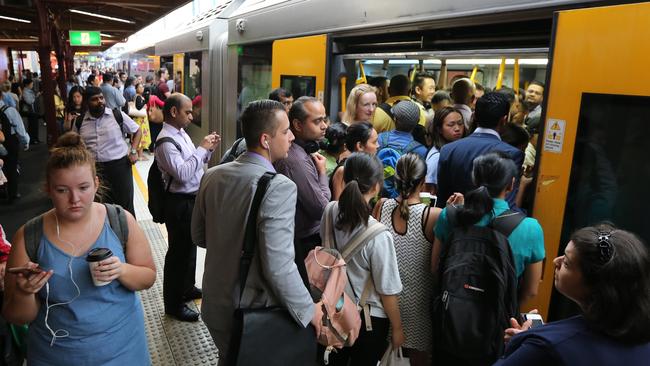
With trains operating on a Saturday schedule, services were cut by nearly half, meaning trains arrived roughly every 15 minutes rather than every eight minutes.
Trains heading into the city were jam-packed by 7.30am, according to social media.
“Elbow to elbow in sweating business shirts and gym bags this humid January morning commute. Avoid train transport at all cost, mines no longer got any capacity for anymore customers,” wrote Chloe Grabham on Twitter.
“T1 Line from Penrith-City. Cannot move,” Nine Network tweeted.
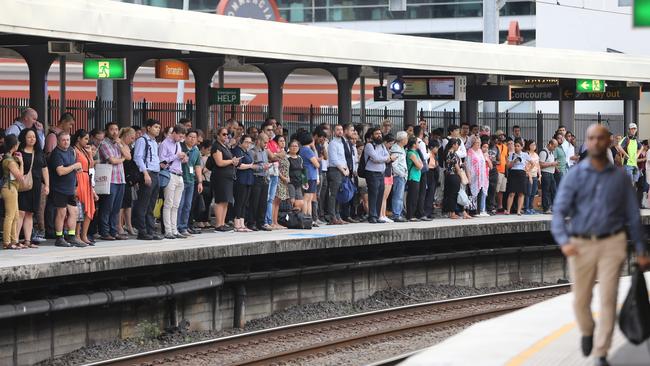
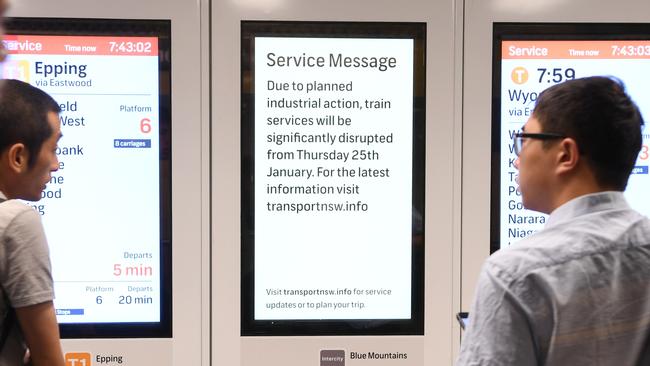
TRAVEL THIS AFTERNOON
Transport for NSW co-ordinator general Marg Prendergast said, despite calling on hundreds of additional buses, authorities would still be unable to replace the full capacity of cancelled services.
“Customers should consider whether they need to travel at all but if they do, should allow plenty of additional travel time, expect delays and travel outside the morning and afternoon peak periods,” she said.
A Town Hall train at Central. Commuters packed in like sardines @dailytelegraph #SydneyTrains #SydneyTrainstrike pic.twitter.com/KzRth0YWQ4
— Dani Le Messurier (@danilemess) January 24, 2018
Ms Prendergast said Central, Town Hall and Wynyard are anticipated to be the most crowded stations this afternoon — at least until the strike action is lifted at 6pm.
“What we envisage is it will be very, very crowded and there will be times when we have to close the station or the platforms at least,” she told reporters.
“We’re working with police, and Sydney Trains will also be there, to manage those crowds. Keeping people moving and keeping them safe is our objective in light of a reduced service.”
Central station is absolutely packed. @dailytelegraph #sydneytrains pic.twitter.com/nDkH85WS4a
— Nick Calacouras (@NickCalacouras) January 24, 2018
Ms Prendergast said commuters should go ahead with their planned Australia Day festivities.
“From 4pm in the afternoon we do have additional bus services and an event timetable for rail so if you’re coming in to enjoy the festivities in the city or elsewhere, please,” she said.
COMMUTERS HAVE THEIR SAY
Although the strike has now been cancelled, this morning commuters were worrying about what would happen on Monday.
City worker Zahad Sumon, 32, usually slides straight into a seat at Punchbowl Station for his Bankstown Line journey but was stood shoved against fellow commuters on a hot carriage this morning.
“I usually get a seat. I hope they sort it out as early as possible,” Mr Sumon told the Daily Telegraph’s Nick Hansen. “On Monday it’s a full strike so what are we going to do? Get an Uber — who’s going to pay? I asked if I could work from home. But not everyone can do that.”
Anecdotal reports from social media suggest most Sydneysiders stuck together to get through the transport chaos this morning.
@GrillTeam Travelling from Penrith to the City. Just getting to Parrramatta. Leaving people at stations #SydneyTrains pic.twitter.com/lDPyHH3phR
— Mark Fuller (@mildo23) January 24, 2018
The trains were so packed this morning that some train drivers allowed up to three passengers to travel in the drivers’ compartment with them.
Scores of commuters were packed in like sardines on services leaving Wynyard Station.
Bill Manning, 23, travelled from East Hills to St Leonards.
“It’s just a bit slower and a bit more crowded,” he said at Wynyard Station. “It’ll be worse for the people who got on the train after me.”
Some commuters expected to get to work late today despite leaving home earlier than usual.
Randwick resident Caoimhe Regan, 27, missed her train due to the timetable disruptions despite leaving early for her job in Merrylands.
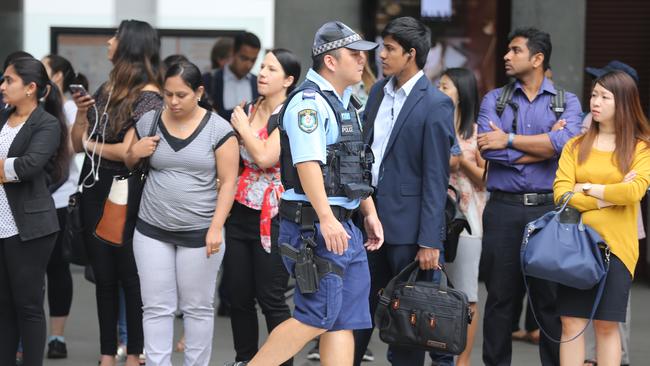
“I left a bit early today because my housemate told me the train times are going to like the weekend timetable. The bus from Randwick was a bit busier than what it usually is for that time in the morning,” she said at Central Station.
On the Bankstown line, one packed train continued to run despite having a smashed window.
Trains are normally evacuated and taken out of service following this type of damage but such has been the demand on services today that station staff just taped the window up to secure it and the train continued on its way.
Traffic was also banked up in the M5 tunnel heading into Sydney this morning as more cars than usual hit the roads.
Even at 4.30am, at least double the number of vehicles were on the motorway — some possibly starting their long weekend ahead of tomorrow’s Australia Day public holiday.


